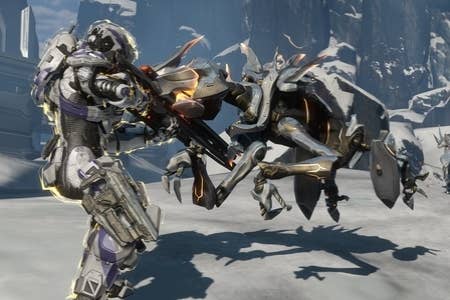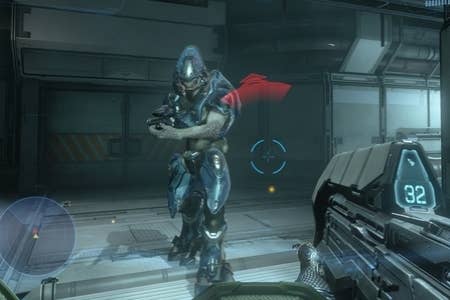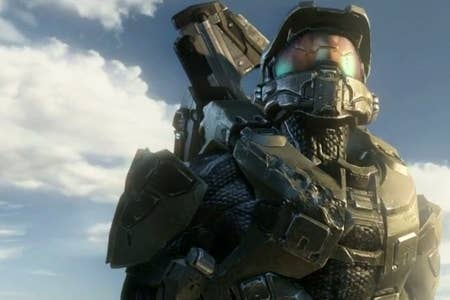343 Industries: Halo 4 and the untapped power of Xbox
This generation of consoles isn't dead yet, says Frank O'Connor. And his latest game will prove it
Walking across the floor of the Eurogamer Expo with Frank O'Connor, Halo 4 franchise development director, takes longer than you think. People stop him to talk about Fable, developers want to chat, and the odd dude clutching a Halo poster even wants an autograph.
O'Connor is polite but baffled, but it's a good sign. Halo 4 is the first original title from 343 Industries, and comes with a load of new features, including new episodic cooperative content, Spartan Ops. And as O'Connor explains below, in-between chat about the survival of this gen consoles and world wars, the internet isn't keen on change.
"There are 9 million people in the rest of the world that are the silent majority who don't know who makes the game. They don't play certain parts of it and they don't care"
I'm not tired of it at all. I was obviously part of Bungie for a long time and it's a completely legitimate question. I think that Bungie was so innovative and so technically adept and so originally that when you put the number 4 in front of something people are naturally cynical anyway and they have absolutely no reason to trust or believe that this new outfit is going to be able to follow in those footsteps. So I'm not sick of the question, and I'll be answering it for years. And that answer is always going to be the same, it's a hard act to follow but I think we assembled a team that was capable of doing something really interesting in the universe and taking it forward in appropriate ways.
Because it's not going to be perfect, when the game comes out, there are going to be things as it was at Bungie that people don't like and complain about and that's the nature of gaming. Especially the nature of a game like Halo which has so many constituent pieces, and so many constituencies of players.
And that's the beauty of the internet. Before when you had a subjective opinion nobody got to find out how wrong it was and now people instantly broadcast how wrong your opinions are all over the world, and again, Halo has got lots of different parts and so it has lots of different audiences and they all think they're the main target.

At a very high level you have to take a step back and say if ten million people are playing your game, and a 100,000 people are online talking about it, that is a representative sample for polling, but the kind of people and the kind of conversations they have tend to funnel down in a really narrow area. But that means there are 9 million people in the rest of the world that are the silent majority who don't know who makes the game. They don't play certain parts of it and they don't care. So you have to make the game for those people too since they're the bulk of your consumers. So respecting those constituencies and walking that tightrope between the features and making sure that you're giving enough love and attention to each of those features.
And as you mentioned the hardest part is changing things and evolving things. All change is viewed negatively immediately, and that's the nature of change. People have to try the experience. You saw the people out there talking to us after they'd played it, nobody came up and said 'I hated that.' We have to be confident with the decisions we make and hope that that reaction is universal.
A huge amount of code. We inherited the engine, it's more of a continuum of code rather than a single engine. It's a lot of pieces and a lot of tools. We actually had the luxury though of being able to take it and experiment with and tear pieces of it out, rebuild pieces of it, so there's a lot of significantly different code in it, and there's a lot of familiar code.
Halo has a certain feel and a certain spirit that's directly connected to the engine content, sometimes you have to improve it but you can't change it or break it. So that's job one, everything after that is technology and evolution.

The funny thing is I've been asked that question a lot, I think it's natural as we start looking forward to the next generation of hardware. But I would actually strongly contest the fact that the Xbox 360 is at the end of its life cycle, this has already been one of the longest generations and there's a really good reason for it, which is that current consoles are incredibly flexible and still really powerful. The reason that Halo 4 looks good is that that machine has an awful lot of untapped power still and it's going to continue to.
I think that looking forward into the future I can see years from now, even after next-gen platforms are out, that you'll have lower priced versions of the existing consoles happily living side by side and serving really valuable functions. Not just becoming the little brothers like cast offs, but still being your Netflix player, still being your DVD player, your Blu-ray player in the case of the PS3, and still doing really vital things around your house. And that means if people are still using it they're still going to want gaming experiences on it.
I would say that I expect this generation will last a lot more years. Now you've got your hardcore fans who are going to look at that statement and say 'but I want new hardware.' We know new hardware is going to come, it always does, but I think the utility of the older consoles is going to last longer than ever before.
"Some people came to this generation pretty late. They're going to have a good experience and a pretty good selection of software for the next few years as a result of this long tail"
Right, and some people came to this generation pretty late so if you think about it from their perspective, they're not the hardcore gamers and they're not the early adopters. They're going to have a pretty good experience and a pretty good selection of software for the next few years as a result of this long tail. It's going to be a healthy ecosystem for a while.
It's both. It's really challenging but I've always thought about it like - and this is how we've built it deliberately with novels and extended franchises - the game always felt a bit like World War 2 to me. It felt like there was definitely a good guy and there was definitely, literally, a bad guy and you can't say that about a lot of wars. Wars are complicated and there are perspectives, but there was one bad guy and one good guy in World War 2 and they had different silhouettes just like a video game. You can recognise the square, angular lines of a messerschmitt plane versus the smooth round lines of a spitfire and it was this really weird, almost - and this is a terribly cynical, ignorant thing to say - but there was a game like symmetry about that period of time. And so I've always thought about the Halo universe as a piece of real history that we just simply had to fill in.
And so when we create this extended fiction we're creating history we can then pull from, and if you think about the number of different stories you can tell in World War 2, I mean you can tell anything from - and this is the wrong period of course - but anything from The English Patient to Pearl Harbour. Completely different types of story that rely on period sensibilities and content. We're going to create that in the extended franchise, and that's its main and primary purpose. We don't use that to tell stories that you need to know to play the games, we use it to create a universe that can make the universe in the game feel more substantial.
"We know new hardware is going to come, it always does, but I think the utility of the older consoles is going to last longer than ever before"
It's a combination of a bunch of things and some of them are maybe not that obvious. One of them is that half of our players play campaign, and don't ever touch multiplayer, and we have a significant number of people who play multiplayer and never touch campaign, and we wanted to kind of cross those streams and bridge that experience. One of the ways to do that was with a cooperative online experience that had some competitive and career elements. So everything you do in Spartan Ops feeds into the multiplayer career and will unlock some things faster. So if you really want a battle rifle, you'll get it quicker by playing a couple of missions of Spartan Ops. We're not going to force you to do anything, but it will lubricate your experience and maybe bridge that gap and maybe get some people who are multiplayers to try the campaign and vice versa.
The other thing is that in a game narrative people play a campaign for ten hours. We as narrative creators can't control how that content is digested and you can't manipulate people in the way that you can with a movie. In a movie I know it's going to last an hour and 40 minutes, as a director I can make you sad at the start, hopeful in the middle and joyously happy in the end, and you control that whole experience with music and timing. Can't do that in a video game that lasts ten hours.

Spartan Ops gives us an opportunity to tell stories and control the pace and cadence of the narrative experience by making these little discrete chunks of story that are episodic, so just like a TV show. Just as manipulative and controllable in terms of experience, but we can apply that same reasoning to the gameplay. They're little short chunks of gameplay that are about the length of a long multiplayer session and we know exactly how we can make people feel in that experience, and reduce boredom, increase variety and again, maybe then drive people from that experience into multiplayer if that's something they hadn't considered and again vice versa.
So it serves a lot of different purposes, and I don't think any of them are terribly obvious. And the other thing that you get as a result of that, and it grew organically out of those conversations and prototypes, but it's also a nice piece of value. It's free for anyone who buys the game and it's about the length of a whole campaign, so it's a win win for us in a lot of ways but you're right, there's been a tremendous amount of work and experimentation to get it where it is now.

